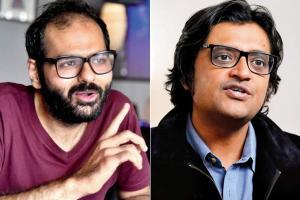'Kamra did nothing wrong'. Yet, what language should protest take? In a week of questions, here's understanding what countering hate speech means in the time of extremism

Kunal Kamra. Pic/Pradeep Dhivar. (Right) Arnab Goswami. Pic/Getty Images
Last week's headlines were dominated by standup Kunal Kamra's 1.51 minute video questioning editor Arnab Goswami on an Indigo flight for the views propagated by his news channel, accused of being right-wing and supporting action against those protesting the Citizenship (Amendment) Act (CAA) and National Register of Citizens (NRC).
ADVERTISEMENT
The video, which went viral and also led to other airlines putting Kamra on a no-fly list, albeit without following the rules laid down by the DGCA for such a ban, has led to a conversation on how far were actions on both sides legitimate, and more importantly, how does one engage with opposing views in times like this? Was Kamra's heckling acceptable, and if yes, how "he" was different from "them"?
Pritish Nandy, media and television personality, says, "The pilot of the plane [in a letter to the airlines] has said that nothing happened which warranted official reporting. There has been no police complaint made by any passenger, including the one he [Kamra] spoke to. There has been no FIR filed with the police. So, what are you punishing Kunal Kamra for? For criticising a media owner-cum-TV host about his political position in a public space? Is that a crime? And if it is indeed a crime, was a probe ordered as per DGCA rules? The maximum punishment, if at all a punishment is warranted, can be for 30 days. In this case, three airlines have taken Kamra off [their fly list] for six months and Air India indefinitely. Is this reasonable? Is this lawful? Of course not. The minister [Hardeep Singh Puri, aviation minister] knows it is illegal, which is why he has subsequently stated that rules should be broken at times. Is that what a minister should be doing? Breaking rules? Are we going insane?"

Pritish Nandy and Maya Mirchandani
Maya Mirchandani, Senior Fellow at the Observer Research Foundation and professor of media studies at Ashoka University, says that the universally accepted definition of counter speech, is a crowdsourced response to a comment or an act of violence or incitement—ideological or otherwise—and, instead of responding with violence, there needs to be a focus on "is there a way that you can have a conversation by engaging with the other side."
On the Kamra episode, she says, "that he decided to challenge somebody for their behaviour and views would have made it counter speech, but the location and way it was done puts it in a grey area. Counter-speech is not just asking someone a question or ascribing blame, you have got to provide an alternative view."
Mirchandani wrote a paper on the issue for ORF, published in 2018, titled Encouraging counter-speech by mapping the contours of hate speech on Facebook in India. On, whether society needs counter speech, she says it's more important now, because those on the extreme views of any issue will be speaking in their own echo chambers and be unwilling to listen to another point of view. "However, someone who is not necessarily a party to this will be able to weigh in as an objective bystander. On social media, this began as a move for deradicalising young potential recruits to radical violence networks and organisations. You could not pull down posts because that violates freedom of speech, so you get a number of people to engage in peaceful conversation. That requires conviction. It's not an issue that you have a role in, but may have a stake in and there's a possibility of a backlash. Incentivising counter speech is important. For instance, the third party would say that every religion preaches peace. It's when people misrepresent it that it becomes problematic."
It's important, also, that counter speech graduates from the online space to offline. "For instance, in the early days of the CAA protest, students in Delhi offered the local police roses. That's saying, we don't want to fight with you, we want to talk to you. That's counter speech," adds Mirchandani.
Catch up on all the latest Mumbai news, crime news, current affairs, and also a complete guide on Mumbai from food to things to do and events across the city here. Also download the new mid-day Android and iOS apps to get latest updates
 Subscribe today by clicking the link and stay updated with the latest news!" Click here!
Subscribe today by clicking the link and stay updated with the latest news!" Click here!






